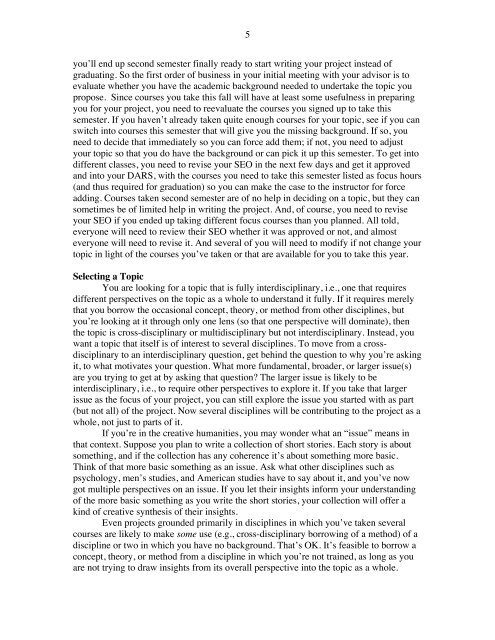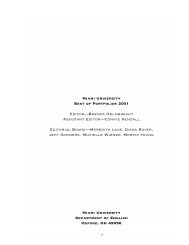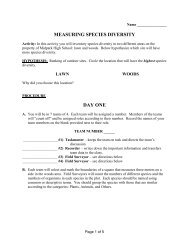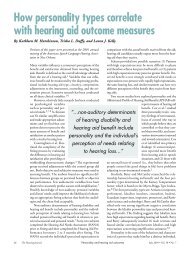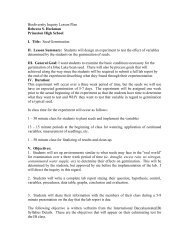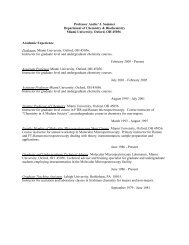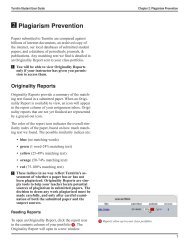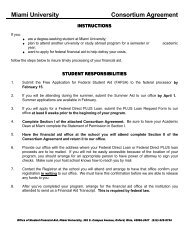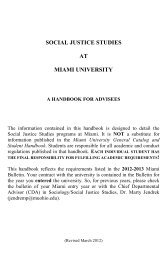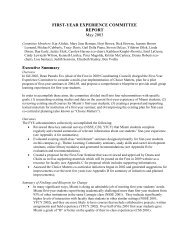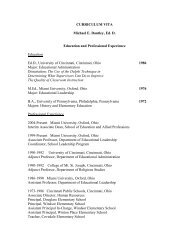Interdisciplinary Research Manual - Units.muohio.edu
Interdisciplinary Research Manual - Units.muohio.edu
Interdisciplinary Research Manual - Units.muohio.edu
Create successful ePaper yourself
Turn your PDF publications into a flip-book with our unique Google optimized e-Paper software.
5<br />
you’ll end up second semester finally ready to start writing your project instead of<br />
graduating. So the first order of business in your initial meeting with your advisor is to<br />
evaluate whether you have the academic background needed to undertake the topic you<br />
propose. Since courses you take this fall will have at least some usefulness in preparing<br />
you for your project, you need to reevaluate the courses you signed up to take this<br />
semester. If you haven’t already taken quite enough courses for your topic, see if you can<br />
switch into courses this semester that will give you the missing background. If so, you<br />
need to decide that immediately so you can force add them; if not, you need to adjust<br />
your topic so that you do have the background or can pick it up this semester. To get into<br />
different classes, you need to revise your SEO in the next few days and get it approved<br />
and into your DARS, with the courses you need to take this semester listed as focus hours<br />
(and thus required for graduation) so you can make the case to the instructor for force<br />
adding. Courses taken second semester are of no help in deciding on a topic, but they can<br />
sometimes be of limited help in writing the project. And, of course, you need to revise<br />
your SEO if you ended up taking different focus courses than you planned. All told,<br />
everyone will need to review their SEO whether it was approved or not, and almost<br />
everyone will need to revise it. And several of you will need to modify if not change your<br />
topic in light of the courses you’ve taken or that are available for you to take this year.<br />
Selecting a Topic<br />
You are looking for a topic that is fully interdisciplinary, i.e., one that requires<br />
different perspectives on the topic as a whole to understand it fully. If it requires merely<br />
that you borrow the occasional concept, theory, or method from other disciplines, but<br />
you’re looking at it through only one lens (so that one perspective will dominate), then<br />
the topic is cross-disciplinary or multidisciplinary but not interdisciplinary. Instead, you<br />
want a topic that itself is of interest to several disciplines. To move from a crossdisciplinary<br />
to an interdisciplinary question, get behind the question to why you’re asking<br />
it, to what motivates your question. What more fundamental, broader, or larger issue(s)<br />
are you trying to get at by asking that question? The larger issue is likely to be<br />
interdisciplinary, i.e., to require other perspectives to explore it. If you take that larger<br />
issue as the focus of your project, you can still explore the issue you started with as part<br />
(but not all) of the project. Now several disciplines will be contributing to the project as a<br />
whole, not just to parts of it.<br />
If you’re in the creative humanities, you may wonder what an “issue” means in<br />
that context. Suppose you plan to write a collection of short stories. Each story is about<br />
something, and if the collection has any coherence it’s about something more basic.<br />
Think of that more basic something as an issue. Ask what other disciplines such as<br />
psychology, men’s studies, and American studies have to say about it, and you’ve now<br />
got multiple perspectives on an issue. If you let their insights inform your understanding<br />
of the more basic something as you write the short stories, your collection will offer a<br />
kind of creative synthesis of their insights.<br />
Even projects grounded primarily in disciplines in which you’ve taken several<br />
courses are likely to make some use (e.g., cross-disciplinary borrowing of a method) of a<br />
discipline or two in which you have no background. That’s OK. It’s feasible to borrow a<br />
concept, theory, or method from a discipline in which you’re not trained, as long as you<br />
are not trying to draw insights from its overall perspective into the topic as a whole.


